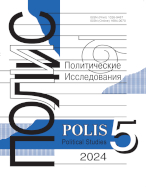Foreign-Policy Aspects of the US Presidential Campaign-2000 (From Conflict of Ideologies to Strategic Consensus)
Rubric: DOSSIER
For citation:
Rogov S.S. Foreign-Policy Aspects of the US Presidential Campaign-2000 (From Conflict of Ideologies to Strategic Consensus) . – Polis. Political Studies. 2000. No. 4
Abstract
The article dwells on what place actually belongs to the foreign-policy problems in the polemic waged within the presidential campaign-2000 in the USA. One can judge about the candidates’ designs and plans by the statements they made at the early stage of the race when from all the others, definitely stood out the two main rivals representing the two major political parties of the United States. It’s worth mentioning that notwithstanding the initial ideological divergence both of the two aspirants and of the parties they represent, their concrete strategies regarding the external world differ only in the way they are substantiated. Both Albert Gore, the Democrat, and George Bush Jr., the Republican, make a stand for the necessity of America’s retaining the global leadership and for active foreign policy directed at the dissemination of the values of freedom and democracy (this position is vindicated by Gore) or at the prevention of possible threats to America’s might coming from other countries (such are the concerns Bush sets himself as objects). But, in any event, neither of these two main participants of the approaching elections has any doubt that the values advocated by America have nowadays no alternative and that the general acceptance of the USA as the world leader is in the interests both of individual countries and of the world as a whole.
Content No. 4, 2000
See also:
Farukshin M.Kh.,
Subjects of Federations in the International Relations. – Polis. Political Studies. 1995. No6
Malkin V.A.,
British Labour Intellectual Leader on State and Society in the Epoch of Globalization. – Polis. Political Studies. 2003. No5
Ushakin S.A.,
Speech as Political Action. – Polis. Political Studies. 1995. No5
Novikova G.V.,
The «Strong Strategy» of the Weak (The Terror at the End of the 20th Century). – Polis. Political Studies. 2000. No1
Tarasova N.N.,
New Forms of Production Management. – Polis. Political Studies. 1993. No2





.jpg)






 print
print.jpg)
.jpg)
